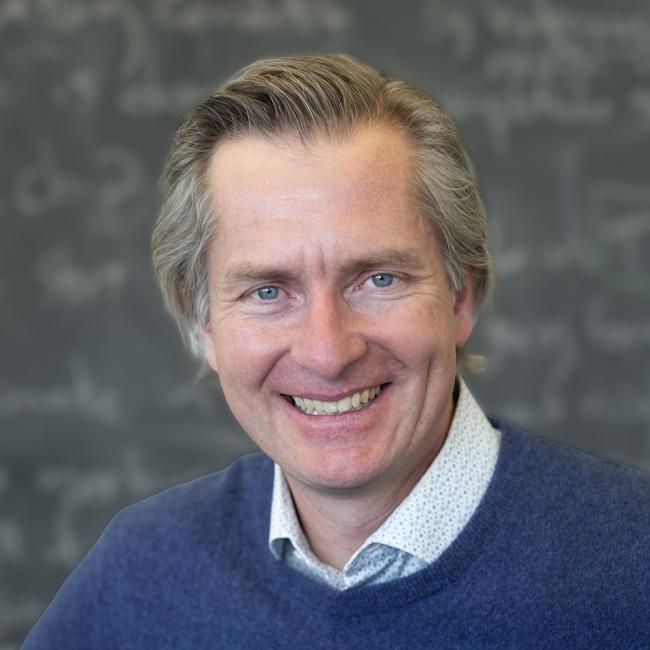AAS Names David Charbonneau as Fred Kavli Plenary Lecturer for 245th Meeting
Share this Page

David Charbonneau
With support from the Kavli Foundation, the Vice Presidents of the American Astronomical Society (AAS) name a special invited lecturer to kick off each semiannual AAS meeting with a presentation on recent research of great importance. At the 245th AAS meeting in National Harbor, Maryland, on 13 January 2025, the Fred Kavli Plenary Lecture will be given by Dr. David Charbonneau, an astronomer at Harvard University.
Charbonneau's research focuses on the detection and characterization of extrasolar planets, with the eventual goal of studying inhabited worlds. Within the context of this goal, Charbonneau also explores novel ground- and spaced-based instrumentation and studies stellar astrophysics, focusing on the magnetic activity of nearby solar and low-mass stars.
The AAS Vice Presidents awarded Charbonneau with the AAS 245 Kavli lectureship "for foundational work in the field of exoplanets, from the discovery of the first transit to major advancements in our understanding of exoplanet atmospheres. Charbonneau's pioneering work has paved the way for the detection and characterization of a growing number of exoplanetary systems that are the building blocks for the eventual detection of truly habitable planets."
David Charbonneau's quarter-century career in exoplanet research includes an abundant list of firsts. Charbonneau pioneered the technique of using transits — when planets pass between us and their host stars — to detect and characterize distant planets, setting the stage for the wealth of exoplanets that have since been discovered with transit-based observatories like Kepler and the Transiting Exoplanet Survey Satellite (TESS). He made some of the first observations of exoplanet atmospheres — first with the Hubble Space Telescope, exploring the composition of atmospheres in transmitted light, and later with the Spitzer Space Telescope, marking the first detection of light emitted by an exoplanet.
Charbonneau has also worked to develop new methods and facilities in pursuit of observations of small, terrestrial planets. One example is the MEarth Project — two arrays of small, robotic telescopes that jointly observe thousands of nearby M-dwarf stars to hunt for transits of potentially habitable Earth-like planets. He is also a co-investigator in the NASA TESS Mission and the HARPS-N Spectrograph, and he is principal investigator for the Tierras Observatory, a new ultra-precise, fully automated photometric observatory that will search for terrestrial planets smaller and cooler than those previously discovered.
David Charbonneau earned his PhD from Harvard University and conducted postdoctoral research at the California Institute of Technology before returning to Harvard as faculty in 2004. He is a recent co-recipient of the 2024 Kavli Prize in Astrophysics and in 2009 received the Alan T. Waterman Prize from the National Science Foundation.
The AAS is delighted to honor Dr. Charbonneau with the January 2025 Fred Kavli Plenary Lectureship.
Contact:
Susanna Kohler
AAS Communications Manager & Press Officer
+1 202-328-2010 x127
Grant Tremblay
AAS Senior Vice President, Center for Astrophysics | Harvard & Smithsonian
Megan Watzke
Image:
Astronomer David Charbonneau of Harvard University will give the Fred Kavli Plenary Lecture opening the 245th meeting of the American Astronomical Society in National Harbor, Maryland, on 13 January 2025. Photo provided by David Charbonneau.
The Kavli Foundation, established in December 2000 by Fred Kavli, a California business leader and philanthropist, is dedicated to advancing science for the benefit of humanity, promoting public understanding of scientific research, and supporting scientists and their work. The foundation’s mission is implemented through an international program of research institutes, professorships, symposia, and other initiatives in the fields of astrophysics, nanoscience, neuroscience, and theoretical physics.
The American Astronomical Society (AAS), established in 1899, is a major international organization of professional astronomers, astronomy educators, and amateur astronomers. Its membership of approximately 8,000 also includes physicists, geologists, engineers, and others whose interests lie within the broad spectrum of subjects now comprising the astronomical sciences. The mission of the AAS is to enhance and share humanity’s scientific understanding of the universe as a diverse and inclusive astronomical community, which it achieves through publishing, meetings, science advocacy, education and outreach, and training and professional development.
The Center for Astrophysics | Harvard & Smithsonian is a collaboration between Harvard and the Smithsonian designed to ask—and ultimately answer—humanity's greatest unresolved questions about the nature of the universe. The Center for Astrophysics is headquartered in Cambridge, MA, with research facilities across the U.S. and around the world.
This release was originally issued by the American Astronomical Society: https://aas.org/press/aas-names-david-charbonneau-fred-kavli-plenary-lecturer-245th-meeting